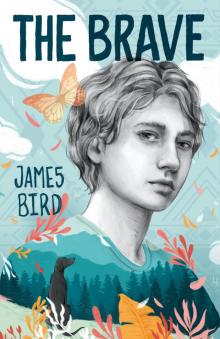- Home
- Nicholas Evans
The Smoke Jumper Page 36
The Smoke Jumper Read online
Page 36
Nevertheless he could see just how young many of them were and how they were dwarfed by their rifles. Those in front wore fatigues, most of which were ragged and many sizes too big. The clothes of those behind looked as though they had been salvaged from a garbage dump, torn and dirty T-shirts and pajama tops and pants that were frayed and caked with filth. Some had boots and others sandals made from tires but many more stood barefoot. The soldiers were mostly boys but there were girls among them too and many more behind, huddled with the sorry ranks of women who were kidnapped to cook and carry and serve as sex slaves to the older soldiers. And now all of them, every man, woman and child, stood gazing aloft as if some great truth were about to be revealed.
A few last stars still glimmered in a sky that had gone through many shades of pink and purple and now blazed in a swath of orange above the dark mountains far away to the east where soon the sun would rise. Connor didn’t need to ask again what was going on. There could only be one reason for everyone to be gathered here: Daniel Makuma, The Blessed One, mystic, prophet and supreme spiritual leader of the Warriors for God, was about to descend from the heavens. It was a moment for which Connor had waited many months and he couldn’t suppress a quickening of excitement.
So thick was the web of myth and falsehood that had been spun around him, that facts about Makuma were hard to come by. All that was really known was that he was an Acholi from the north of Uganda, that he was forty-two years old and that he was a distant and disaffected cousin of Joseph Kony, the notorious leader of the Lord’s Resistance Army, who terrorized other parts of the north. Both claimed to be the rightful heir to the Acholi warrior-priestess Alice Lakwena, whose brutal blend of Christianity and local magic had come close, some fifteen years ago, to toppling the Ugandan government. The rebellion had been bloodily crushed and Lakwena had simply vanished.
Makuma’s followers claimed that he, like Lakwena, was a medium who communed with the spirit world in many esoteric ways, often through the souls of animals, and had been instructed in a vision by the Holy Ghost, Tipu Maleng, to continue the holy war against the ‘great evil’ that governed the country.
To that end, for more than a decade, he had bolstered the delinquent rabble of his rebel army with abducted children and from bases such as this, in southern Sudan, sent them forth in God’s name over the border to burn and rape and murder and pillage their way across the land he claimed to love and sought to save. All this was done with the blessing of Sudan’s Islamic government in Khartoum which supplied copious amounts of arms on condition that they also be used against the Sudanese People’s Liberation Army which for nearly two decades now had been fighting its own civil war.
Connor knew more than he cared to remember about the methods of Makuma’s army. He had photographed the charred aftermath of its raids, counted the dead and met suspected informers whose lips and ears had been removed as a lesson to others.
Until now Makuma had never once granted access to a western journalist or photographer and it had taken every atom of guile and persistence that Connor possessed to find his way through the maze of secrecy and paranoia with which The Blessed One’s acolytes had surrounded him.
To make initial contact Connor had flown first to Nairobi where the WFG kept a discreet office in a dingy back room above a travel agency. There was a three-week wait, presumably while they checked him out. Every couple of days Connor would call until finally one of the officials told him that his request to meet The Blessed One was still being considered and that he must fly to Khartoum. Connor’s heart sank. Americans were about as popular there as a dose of malaria but the official said he would talk to the Sudanese embassy about expediting Connor’s visa application. It took another three weeks, but at last the visa came through.
In Khartoum the waiting grew worse. The people at the WFG office treated him as if he were a tiresome insect, brushing him off again and again and telling him to come back the next day and then the next and the next. He was made to fill in forms and submit his passport and a resumé and a list of the questions he wanted to ask. When, after three weeks, he at last succeeded in meeting someone of apparent authority, he was told rudely that he must not come to the office again but instead wait at his hotel. His request for an interview with The Blessed One was still being considered. He would be informed of the decision in due course. Sweet-talking the western media clearly wasn’t a WFG priority.
After a month wandering the streets and communing with cockroaches in his hotel room, finally it happened. At the dead of night there was a hammering on his door and two men with machine pistols told him to pack his things and come. They bundled him into the back of a truck and drove him out of town to an army base, where an unmarked transport plane stood ready to go. He was told to climb in among the crates, a few of which seemed to contain food and the rest arms and ammunition. The flight took many hours and was about as grueling as any Connor had ever made. There were neither proper seats nor windows and hardly any air and it got so hot he nearly passed out. When he next saw the light of day it was here on this godforsaken plateau where he now stood. Naturally nobody would tell him the camp’s precise location, but he knew he was in the far south of Sudan and that Uganda’s northern border must be close by.
It was only on arriving that he had finally lost patience. He had been led to believe that Makuma would be here, but it quickly emerged that he wasn’t. When, or indeed whether, he was coming, nobody either knew or would disclose. It became apparent that the bullying Colonel Okello hadn’t been consulted about Connor’s visit and consequently did his best to make things as difficult as possible. He even tried to confiscate his cameras and relented only when Connor flew into a rage. But it was hardly worth having them for he was kept under virtual house arrest and banned from taking pictures. He couldn’t even take a walk or a leak without an armed escort.
Of course, Okello and everyone else assumed that the purpose of his visit was to photograph and interview Makuma. Which was fine. It was what he wanted them to think. His real mission, the vow that he had made to himself after that night of revelation on the Skeleton Coast, would remain secret until he had the chance to reveal it to the man himself.
Now, with the sun flaring up behind the mountains, a murmur spread across the waiting crowd. One of Okello’s henchmen had been talking into a shortwave radio and now he called out and pointed and Connor looked away to the north and saw the lights of a plane, as bright as twinned stars, lowering toward the plateau.
The plane circled above them once and as if on cue the sun broke from the mountains and flashed on its silver wings and a moment later the plateau and all who stood upon it were bathed in a golden light. Connor marveled at the audacity of the man, that he should so stage-manage his arrival. And watching the lit faces of these stolen children, their lives benighted by this same man who now would have them see him as the Bringer of Light, Connor saw that they were indeed impressed.
With a nod from Okello, he started to photograph the plane which was making its final approach from the east. The landing strip was the shape of a vast cross marked with whitewashed stones and as the plane touched down it cast a smaller cross of traveling shadow along it and a spiraling cloud of sunlit dust behind. The plane slowed and turned in the lateral and began to taxi back. Colonel Okello shouted an order and the drums began to thump and boom and all the women and girls raised their voices as one in a sustained, high-pitched trill. Okello called for Connor to follow and set off toward the plane with a little reception committee of senior officers shambling after him.
The plane stopped and a moment later the door opened and steps unfolded to the ground. Then a small figure, dressed all in white, stepped into the sunlight and a cheer went up from all the soldiers, so great that even the drums and the ululation of the women were for a moment drowned. Makuma stood at the top of the steps with both his arms aloft and Connor zoomed in on his smiling face.
Through the lens he saw a slight and handsome man with delicate f
eatures and a neat mustache. From a long chain around his neck hung a heavy gold cross. His eyes and his smile were beatific. He lowered his arms and came carefully, almost daintily, down the steps, followed by a small group of advisors and bodyguards.
Okello walked forward in welcome and Makuma opened his arms and the two of them embraced. A pretty teenage girl in smart green fatigues was waiting with a garland of flowers and on a sign from Okello she stepped forward to place it around Makuma’s neck. As he lowered his head he glanced sideways at Connor and stared straight into the lens and in that brief moment Connor caught, or thought he caught, a glimpse of something in the man’s eyes far colder and more daunting than the saintly smile that lingered on his lips.
Okello was about to lead the party off on a tour of inspection when Makuma turned and walked toward Connor. Connor took one more picture then lowered his camera and shook the hand that Makuma offered.
‘I am sorry that you have had to wait so long. I understand that you have been here many days.’
His voice was gentle and his English meticulous.
‘No problem. Colonel Okello and I had a lot of laughs.’
‘I am glad. Later, I hope there will be time to answer your questions.’
‘I sure hope so. I’ve got a real important one for you.’
The summons came at sunset. Two of Okello’s sidekicks picked him up and drove him along the ridge trail above the camp which Connor had been forbidden to visit. Through the eucalyptus trees he caught glimpses of the baked mud curve of a drying river and beside it a great sprawl of crumbling mud huts and improvised tents and shelters. All was veiled in a blue drift of smoke from campfires and the smell of cooking rose on the golden air and mingled with that hot and primal red-earth scent of Africa that Connor had come to love.
Sheltered among the trees at the end of the ridge and concealed beneath many square yards of camouflage netting, the officers’ camp was a far more salubrious arrangement than the one it overlooked. It was a complex of grass-roofed huts and spacious tents which Connor guessed had probably been looted from some relief agency camp or convoy. As the Jeep pulled up, Okello came out to meet him.
‘The Blessed One is tired and we have much to discuss with him. You have twenty minutes, no more. And no photographs without his permission.’
Connor didn’t bother to argue. Okello led him through a labyrinth of avenues between the tents and huts and Connor could see as he passed that many were crammed with crates of weapons and ammunition and hundred-pound sacks of sorghum and lentils, stamped with the names of various relief agencies. They came at last to an earth-floored yard where two of Makuma’s bodyguards stood outside a hut far grander than the rest. Okello left him there and the guards checked his camera bag and frisked him and then one of them pulled aside the drape that hung in the doorway and nodded for him to enter.
It was dark inside and there was a strange smell, a blend of incense and something musty, almost putrid. For a while all Connor could see was a cluttered trestle table with three empty canvas chairs and a single gas lamp upon it burning low. The mud floor was strewn with grass mats and animal skins. There was no sign of Makuma.
Above the chug of generators outside, he could hear music playing, something classical, a choral piece of some kind. Apart from the little he had learned from Ed, Connor knew nothing about music, yet he was struck by how beautiful this piece sounded. It was coming from a portable CD player wired to two small speakers that sat upon the table and as Connor stepped closer he saw there was a stack of discs beside it, Mozart, Bach and Brahms. The rest of the table was covered with documents and a large-scale map of northern Uganda that was spread open and had a pair of rimless spectacles lying on it.
As his eyes grew accustomed to the dark, Connor saw that the walls of the hut were hung with dark red cloth and animal skins against which leaned branches of bare white wood. And then he saw the glint of eyes and saw that there were birds on the branches and stepping closer realized that it wasn’t only birds but that there was a whole menagerie of dead animals. There were stuffed heads of elephant and buffalo and zebra and many kinds of antelope, their glass eyes all staring at him. There were tusks and horns of all shapes and sizes, bundled on the floor like firewood. In the corner stood a full-bodied lioness, flanked by a leopard and a cheetah and along the wall beyond lay a vast crocodile with its jaws agape and its back piled high with chameleons and lizards and coiled snakes.
In the farthest corner was a doorway draped in zebra skin with a dim light spilling at the edges. Quietly Connor stepped closer and through the gap he saw Makuma. Still dressed all in white, he was kneeling in prayer at an alcoved shrine upon which stood a gold cross and two candles. Just as Connor was wondering if he should slip away and come back later, he saw the man cross himself. Connor quickly headed back to the center of the room and turned in time to see Makuma emerge from the zebra-skin drapes, apparently not at all surprised to find him there. He was holding a small black leather Bible.
‘How much do you know of the spiritual beliefs of my people, Mr Ford?’
‘The Acholi people? Not much I’m afraid.’
Makuma walked past him to the table and put his Bible down on the map. He gestured at one of the canvas chairs and took another for himself and they both sat.
‘Nor did the first white men who came here. Are you familiar with the term jok? No? It is difficult to translate, but broadly it means a spiritual power. A jok can be good or evil, depending on many factors, and all have different names. When the first European missionaries came, they thought they might save more souls if they made their message appear to comply with Acholi beliefs. So they gave their Christian God the name of a jok. They called him Jok Rubanga. Unfortunately it was not initially a great success for there was already a Jok Rubanga: the spirit responsible for causing spinal tuberculosis. Perhaps these poor white men were mischievously advised. Or perhaps it merely proves that one should not meddle with spirits that one does not understand. Do you believe in God, Mr Ford?’
‘I guess it depends what you mean by God.’
‘Ah. So you don’t.’
Connor shrugged. If that’s what he wanted to think, it was fine. Makuma leaned back and folded his hands, staring at Connor with a smile that was both patronizing and vaguely threatening.
‘Do you like Bach?’
‘Is that what you’ve got playing here?’
‘The St. John Passion.’
‘It’s beautiful.’
‘Yes. Do you think such music could exist if there were no God?’
‘Seems to me that many things exist, both good and evil, whether there’s a God who wants them to or not. Is it okay if I record this?’
‘If you wish.’
Connor took his recorder from his pocket and set it beside the Bible.
‘So, you don’t believe in God but you do believe in good and evil?’
‘I know that men are capable of both.’
‘And you believe that you can distinguish between them.’
‘Between good and evil? Yes, I do.’
‘But if there is no God, how can that be possible?’
Connor hadn’t expected any of this. He had thought long and hard about how best to present the proposal that he had come here to make and he knew that it was important not to let himself get riled. After all these years, he was only too aware of his instinct to confront those whose horrors he had witnessed. It was a foolish and perilous flaw. And if they tried to engage him in some kind of intellectual debate, as that murderous Rwandan mayor once had, as Makuma was trying now, it somehow tapped into that old seam of inadequacy, where he was still the kid who had never been to college, and fueled his anger all the more.
It was happening now and he couldn’t help himself. And in answer to Makuma’s question, he opened his camera bag and pulled out the photograph. It was the one he had taken of Thomas, the dumbstruck boy at St. Mary’s. He held it out to Makuma who thought for a moment and then took it. H
e picked up his glasses from the table and put them on and studied the picture.
‘I have seen this before. I read the article and the many lies you told.’
He said it simply with no hint of accusation or bitterness. He handed the picture back but Connor wouldn’t take it. His blood was up and pumping hard.
‘You asked me how I can tell good from evil. What was done to this boy was evil. Your soldiers murdered his mother and his father, abducted him, then forced him to go back and murder the rest of his family and friends and burn down his own village. Then they left him in the bush to die. Tell me, does that sound like evil to you? Or does your God have another label for these things?’
Makuma laid the photograph on the table and then did the same with his glasses. He gently put his palms together as if in prayer and raised his fingertips to his chin and for a long time stared at Connor. His smile had disappeared. The music was building to a climax and now seemed more ominous than beautiful. With his heart still thumping and his head screaming at him to keep cool, Connor stared back defiantly.
‘Whoever told you these things was telling lies,’ Makuma said quietly. ‘We do not abduct the children who fight for our cause. They flock, in their hundreds, of their own free will, to join us. Why? Because they want to help purge our land of the great evil that has seized it. If they are too young we do not let them fight—’
‘That’s bullshit and you know it.’
‘. . . we do not let them fight, but care for them and let them help the cause in other ways. Many of them are indeed orphans. Their parents have been killed by the soldiers of the government. It is the government who tortures and kills my people and who burns our villages and then, with the help of gullible western friends such as yourself, pretends to the world that we are to blame.’

 The Horse Whisperer
The Horse Whisperer The Divide
The Divide The Smoke Jumper
The Smoke Jumper The Brave
The Brave The Loop
The Loop